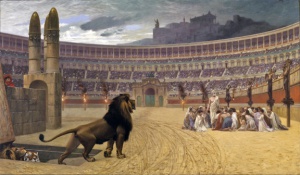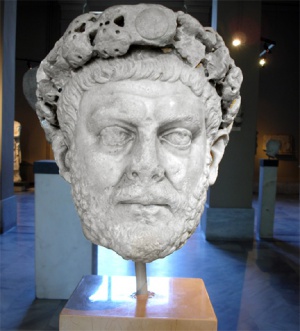Diocletianic Persecution: Difference between revisions
No edit summary |
No edit summary |
||
| Line 38: | Line 38: | ||
Understanding things like the [[Imperial Cult of Rome]] and the two [[Welfare_types]] will give you a perspective on the Christian conflict and the [[Rome vs US|difference between what Rome]] was doing and what we are doing today. | Understanding things like the [[Imperial Cult of Rome]] and the two [[Welfare_types]] will give you a perspective on the Christian conflict and the [[Rome vs US|difference between what Rome]] was doing and what we are doing today. | ||
[[File:Diocletian.jpg|right|thumb]] | [[File:Diocletian.jpg|right|thumb|Diocletian "the embodiment of irrational ferocity" Henry Chadwick]] | ||
A votive deposit or votive offering was an objects displayed or deposited, with no intention of recovery it. It was a sacred given for religious purposes. | A votive deposit or votive offering was an objects displayed or deposited, with no intention of recovery it. It was a sacred given for religious purposes. | ||
| Line 44: | Line 44: | ||
Later edicts targeted the clergy and demanded universal sacrifice, ordering all inhabitants to sacrifice to the genius of the gods. | Later edicts targeted the clergy and demanded universal sacrifice, ordering all inhabitants to sacrifice to the genius of the gods. | ||
Diocletian issued a second edict that targeted ''deacons, lectors, priests, ''and'' bishops''. These people were essential to provide Church services to the needy of the Christian society. So many were arrested the prison system overflowed which caused ordinary criminals to be released. | |||
The persecution varied in intensity across the empire—weakest in Gaul and Britain, where only the first edict was applied, and strongest in the Eastern provinces. Persecutory laws were nullified by different emperors at different times, but Constantine and Licinius's Edict of Milan (313) has traditionally marked the end of the persecution. | The persecution varied in intensity across the empire—weakest in Gaul and Britain, where only the first edict was applied, and strongest in the Eastern provinces. Persecutory laws were nullified by different emperors at different times, but Constantine and Licinius's Edict of Milan (313) has traditionally marked the end of the persecution. | ||
Revision as of 22:37, 11 November 2015
Diocletianic Persecution

The Diocletianic Persecution was some times called the Great Persecution in the Roman empire. In 303, The Emperors including Diocletian at the beginning of the 4th century issued a series of edicts rescinding the legal rights of Christians. This tells us that Christians had rights at that point. Freedom of religion had existed but there had been changes concerning the Christian conflict.
They had outlawed foreign religions through the edicts of Emperor Septimius Severus but now they demanded that everyone comply with traditional Roman religious practices.
What were those practices?
They demanded all inhabitants to sacrifice to the gods.
What did that mean?
The Latin word salus means "safety", "salvation", "welfare". Salus was the goddess of security and well-being this would include individual welfare, health and prosperity bit was also imortant to the peace of the state.
Pax deorum (“peace of the gods”) was the goal of Roman state religion.
Being at peace with the gods was mutually beneficial to the state and the Roman public welfare (salus publica; cf. Cic. Rab. perd. 5). If the Romans were not providing the gods their desired worship there would be shortages in the welfare line and riots would ensue.
The Christian community grew from 250 to 300 A.D. The estimated population of 1.1 million may have grown to as many as 6 million which may have been about 10% of the empire's total population.
With the rise of its popularity with successful Romans who paid into the Church rather than the Pagan Temples of Rome came jealousy and envy. Christians got a lot of criticism but the real problem as always was the money.
The Christian apologist Arnobius of Sicca who wrote Adversus Nationes composed in response to Diocletian's persecution of Christians attributes the persecution to financial concerns to providers of welfare benefits through the pagan temples.
- "The augurs, the dream interpreters, the soothsayers, the prophets, and the priestlings, ever vain...fearing that their own arts be brought to nought, and that they may extort but scanty contributions from the devotees, now few and infrequent, cry aloud, 'The gods are neglected, and in the temples there is now a very thin attendance. Former ceremonies are exposed to derision, and the time-honoured rites of institutions once sacred have sunk before the superstitions of new religions.'"[1]
Religion was more than just superstitions and doctrines but was the performance of their duty to their fellowman by providing a Daily ministration for the needy of society. Fortūna, equivalent to the Greek goddess Tyche was the goddess of fortune while Spes was the goddess of hope. The Christians only practiced Pure Religion and did not depend on the the fortunes of the Fathers of Rome in hope of their benefits. Christians depended upon Charity and not the "extort(ed) but scanty contributions from the devotees" subject to the Genius of Rome.[2]
These were cults and the word cult was a noun from cultus originates from the past participle of the verb colo, colere, colui, cultus, which means "to tend, take care of, cultivate".
Cultus was an aspect of the contractual nature of Roman religion.
You could choose any cult but you had to contribute to one and would need the symbol of that temple displayed by you out side or in your house. You might carry a pendant.
Understanding things like the Imperial Cult of Rome and the two Welfare_types will give you a perspective on the Christian conflict and the difference between what Rome was doing and what we are doing today.

A votive deposit or votive offering was an objects displayed or deposited, with no intention of recovery it. It was a sacred given for religious purposes.
In ancient Roman religion, Annona (Latin annōna “corn, grain; means of subsistence”, from annus "year") is the divine personification of the grain supply to the city of Rome. She is closely connected to the goddess Ceres, with whom she is often depicted in art.
Later edicts targeted the clergy and demanded universal sacrifice, ordering all inhabitants to sacrifice to the genius of the gods.
Diocletian issued a second edict that targeted deacons, lectors, priests, and bishops. These people were essential to provide Church services to the needy of the Christian society. So many were arrested the prison system overflowed which caused ordinary criminals to be released.
The persecution varied in intensity across the empire—weakest in Gaul and Britain, where only the first edict was applied, and strongest in the Eastern provinces. Persecutory laws were nullified by different emperors at different times, but Constantine and Licinius's Edict of Milan (313) has traditionally marked the end of the persecution.
In the Balkans during the autumn of 285, he encountered a tribe of Sarmatians who demanded assistance. The Sarmatians requested that Diocletian either help them recover their lost lands or grant them pasturage rights within the empire. Diocletian refused and fought a battle with them, but was unable to secure a complete victory.
Religion |
Pure Religion |
Private welfare |
Fleeing Religion |
False religion |
Public religion |
Our Religion |
Christian conflict |
Corban |
Baptism |
Benefactors |
That Word |
Daily ministration |
Modern Christians |
Diocletianic Persecution |
Christians check list |
gods |
Judge not |
Judge |
Fathers |
Deist |
Damnable heresies |
Factions at the altar |
Pharisees |
Sadducees |
Zealot |
Essenes |
Levites |
Messianic Judaism |
Menahem the Essene |
Sanhedrin |
Altars |
Clay and Stone |
Red Heifer |
Golden calf |
Freewill offerings |
Religion |
Pure Religion |
Public religion |
Christian conflict |
Paganism |
Denominations |
Dispensationalism |
Benefactors |
Corban |
Daily ministration |
Calendars |
Cult |
Imperial Cult of Rome |
Guru theories| |
Covet |
Merchandise |
Mark of God |
Mark of Cain |
Mark of the Beast |
Nature of the Beast
Section 666 |
Benefactors |
Biting one another |
Cry out |
Worship |
Church |
Temples |
Religious Orders |
Priests |
Kings and priests |
Hear |
Bible Index |
Network |
Footnotes
- ↑ Arnobius, Adversus Nationes, 1.24, qtd. in Davies, 79–80, from a translation by Bryce and Campbell.
- ↑ In Roman religion, the genius (Latin: [ˈɡɛ.nɪ.ʊs]; plural geniī) is the individual instance of a divine nature which is present in every individual. Much like a guardian angel or the Holy Spirit, the genius would guide each individual from birth to death. The rational powers and abilities of every human being were attributed to their soul, which was a genius.